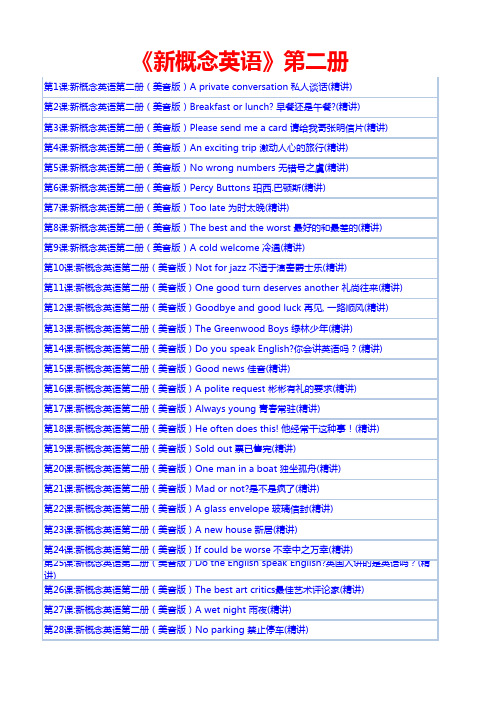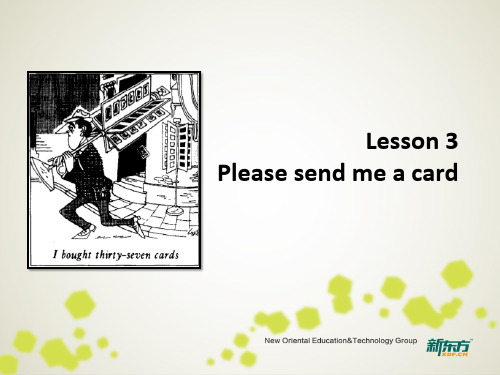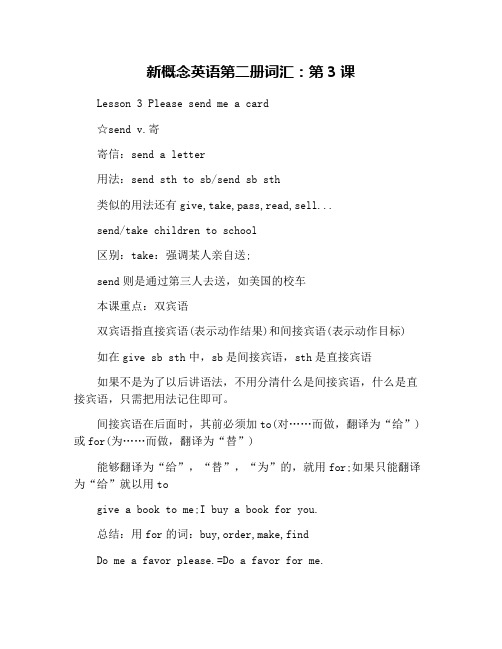新概念第二册第3课课件.ppt
《新概念英语》第二册 电子版

《新概念英语》第二册第1课:新概念英语第二册(美音版)A private conversation 私人谈话(精讲)第2课:新概念英语第二册(美音版)Breakfast or lunch? 早餐还是午餐?(精讲)第3课:新概念英语第二册(美音版)Please send me a card 请给我寄张明信片(精讲)第4课:新概念英语第二册(美音版)An exciting trip 激动人心的旅行(精讲)第5课:新概念英语第二册(美音版)No wrong numbers 无错号之虞(精讲)第6课:新概念英语第二册(美音版)Percy Buttons 珀西.巴顿斯(精讲)第7课:新概念英语第二册(美音版)Too late 为时太晚(精讲)第8课:新概念英语第二册(美音版)The best and the worst 最好的和最差的(精讲)第9课:新概念英语第二册(美音版)A cold welcome 冷遇(精讲)第10课:新概念英语第二册(美音版)Not for jazz 不适于演奏爵士乐(精讲)第11课:新概念英语第二册(美音版)One good turn deserves another 礼尚往来(精讲)第12课:新概念英语第二册(美音版)Goodbye and good luck 再见, 一路顺风(精讲)第13课:新概念英语第二册(美音版)The Greenwood Boys 绿林少年(精讲)第14课:新概念英语第二册(美音版)Do you speak English?你会讲英语吗?(精讲)第15课:新概念英语第二册(美音版)Good news 佳音(精讲)第16课:新概念英语第二册(美音版)A polite request 彬彬有礼的要求(精讲)第17课:新概念英语第二册(美音版)Always young 青春常驻(精讲)第18课:新概念英语第二册(美音版)He often does this! 他经常干这种事!(精讲)第19课:新概念英语第二册(美音版)Sold out 票已售完(精讲)第20课:新概念英语第二册(美音版)One man in a boat 独坐孤舟(精讲)第21课:新概念英语第二册(美音版)Mad or not?是不是疯了(精讲)第22课:新概念英语第二册(美音版)A glass envelope 玻璃信封(精讲)第23课:新概念英语第二册(美音版)A new house 新居(精讲)第24课:新概念英语第二册(美音版)If could be worse 不幸中之万幸(精讲)第25课:新概念英语第二册(美音版)Do the English speak English?英国人讲的是英语吗?(精讲)第26课:新概念英语第二册(美音版)The best art critics最佳艺术评论家(精讲)第27课:新概念英语第二册(美音版)A wet night 雨夜(精讲)第28课:新概念英语第二册(美音版)No parking 禁止停车(精讲)第29课:新概念英语第二册(美音版)Taxi! 出租汽车(精讲)第30课:新概念英语第二册(美音版)Football or polo? 足球还是水球?(精讲)第31课:新概念英语第二册(美音版)Success story 成功者的故事(精讲)第32课:新概念英语第二册(美音版)Shopping made easy 购物变得很方便(精讲)第33课:新概念英语第二册(美音版)Out of the darkness 冲出黑暗(精讲)第34课:新概念英语第二册(美音版)Quick work 破案 “神速”(精讲)第35课:新概念英语第二册(美音版)Stop thief!捉贼!(精讲)第36课:新概念英语第二册(美音版)Across the Channel 横渡海峡(精讲)第37课:新概念英语第二册(美音版)The Olympic Games 奥林匹克运动会(精讲)第38课:新概念英语第二册(美音版)Everything except the weather 唯独没有考虑到天气(精讲第39课:新概念英语第二册(美音版)Am I all right? 我是否痊愈?(精讲)第40课:新概念英语第二册(美音版)Food and talk 进餐与交谈(精讲)第41课:新概念英语第二册(美音版)Do you call that a hat? 你把那个叫帽子吗?(精讲)第42课:新概念英语第二册(美音版)Not very musical 并非很懂音乐(精讲)第43课:新概念英语第二册(美音版)Over the South Pole 飞越南极(精讲)第44课:新概念英语第二册(美音版)Through the forest 穿过森林(精讲)第45课:新概念英语第二册(美音版)A clear conscience 问心无愧(精讲)第46课:新概念英语第二册(美音版)Expensive and uncomfortable 既昂贵又受罪(精讲)第47课:新概念英语第二册(美音版)A thirsty ghost 嗜酒的鬼魂(精讲)第48课:新概念英语第二册(美音版)Did you want to tell me something? 你想对我说什么吗?第49课:新概念英语第二册(美音版)The end of a dream 美梦告终(精讲)第50课:新概念英语第二册(美音版)Taken for a ride 乘车兜风(精讲)第51课:新概念英语第二册(美音版)Reward for virtue 对美德的奖赏(精讲)第52课:新概念英语第二册(美音版)A pretty carpet 漂亮的地毯(精讲)第53课:新概念英语第二册(美音版)Hot snake 触电的蛇(精讲)第54课:新概念英语第二册(美音版)Sticky fingers 粘糊的手指(精讲)第55课:新概念英语第二册(美音版)Not a gold mine 并非金矿(精讲)第56课:新概念英语第二册(美音版)Faster than sound! 比声音还快!(讲解)第57课:新概念英语第二册(美音版)Can I help you, madam? 您要买什么,夫人?(精讲)第58课:新概念英语第二册(美音版)A blessing in disguise? 是因祸得福吗?(精讲)第59课:新概念英语第二册(美音版)In or out? 进来还是出去?(精讲)第60课:新概念英语第二册(美音版)The future 卜算未来(精讲)第61课:新概念英语第二册(美音版)Trouble with the Hubble 哈勃望远镜的困境(讲解)第62课:新概念英语第二册(美音版)After the fire 大火之后(精讲)第63课:新概念英语第二册(美音版)She was not amused 她并不觉得好笑(精讲)第64课:新概念英语第二册(美音版)The Channel Tunnel 海峡隧道(精讲)第65课:新概念英语第二册(美音版)Jumbo versus the police 小象对警察(精讲)第66课:新概念英语第二册(美音版)Sweet as honey! 像蜜一样甜!(精讲)第67课:新概念英语第二册(美音版)Volcanoes 火山(精讲)第68课:新概念英语第二册(美音版)Persistent 纠缠不休(精讲)第69课:新概念英语第二册(美音版)But not murder!并非谋杀!(精讲)第70课:新概念英语第二册(美音版)Red for danger 危险的红色(精讲)第71课:新概念英语第二册(美音版)A famous clock第72课:新概念英语第二册(美音版)A car called bluebird第73课:新概念英语第二册(美音版)The record-holder第74课:新概念英语第二册(美音版)Out of the limelight第75课:新概念英语第二册(美音版)SOS第76课:新概念英语第二册(美音版)April Fools Day第77课:新概念英语第二册(美音版)A successful operation第78课:新概念英语第二册(美音版)The last one?第79课:新概念英语第二册(美音版)By air第80课:新概念英语第二册(美音版)The Crystal Palace第81课:新概念英语第二册(美音版)Escape第82课:新概念英语第二册(美音版)Monster or fish?第83课:新概念英语第二册(美音版)After the elections第84课:新概念英语第二册(美音版)On strike第85课:新概念英语第二册(美音版)Never too old to learn第86课:新概念英语第二册(美音版)Out of control第87课:新概念英语第二册(美音版)A perfect alibi第88课:新概念英语第二册(美音版)Trapped in a mine第89课:新概念英语第二册(美音版)A slip of the tongue 第90课:新概念英语第二册(美音版)What第91课:新概念英语第二册(美音版)Three men in a basket 第92课:新概念英语第二册(美音版)Asking for trouble第93课:新概念英语第二册(美音版)A noble gift第94课:新概念英语第二册(美音版)Future champions第95课:新概念英语第二册(美音版)A fantasy第96课:新概念英语第二册(美音版)The dead return。
新概念英语第二册课PPT课件演示文稿

2)当主句的谓语动词是将来时的时候, 如: He will say, “I’ll try my best to help you.”
——>He will say that he will try his best to help me.
第二十二页,共36页。
1)时间状语:
直接引语 (间接引语)
now (then);
today (that day);
tomorrow (the next / following day ) next week (the next / following week)
yesterday (the day before)
football after school.” ——> He said that when he was a child, he usually played football after school. 5)当直接引语是客观真理或自然现象时,
第二十页,共36页。
如: Our teacher said to us, “Light travels faster than sound.” ——> Our teacher told us that light travels faster than sound. 6)当引语是谚语、格言时, 如: He said,“Practice makes perfect.” ——>He said that practice makes perfect. 7)当直接引语中有情态动词should, would, could, had
作为一名护士,你应该对病人十分耐心。
新概念第二册第3课-Please-send-me-a-card-PPT

链接新目标
send /send/
八上U3-SA 3a-P15
1)send sth. to sb. / send sb. sth
send a letter 寄信 八上U3-SA
类似的用法还有 give, take, pass, read, sell... 3a-P15
2)send / take children to school
I read a few lines,but I did not understand a word.Every day I thought about postcards. think about 考虑,思考 例如:Are you still thinking about
the movie?
think of 考虑,想起 例如:What do you think of my new car?
think over 仔细考虑 例如:Please thinke over what I’ve said.
think out 想出,想通 例如:At last we thought out the answer of the question.
A friendly waiter taught me a few words of Italian.Then he lent me a book.
• decide / make up one’d mind 区别 • decide 指经过考虑对疑难问题、争端等做出决断,含有下决
心取舍的意思。Decide 后常 • 接动词不定式和从句。 • 例如:Te a sailor.
• They couldn’t decide what they should do next. • make up one’s mind 指毫不犹豫的做出决定,意味着“打定
新概念二 第3课课件

★6.postcard/'paostko:d/n.明信片
各种卡片的英文说法 Christmas card 圣诞卡 identity card 身份证 student card 学生 imembership card会员 entry card 入境卡
New-Year card 新年卡 preferential card 优惠卡 seore card 积分卡 intelligence card智能卡
text
熟读课文:
Postcards always spoil my holidays. Last summer, I went to Italy. I visited museums and sat in public gardens. A friendly waiter taught me a few words of Italian. Then he lent me a book. I read a few lines, but I did not understand a word. Every day I thought about postcards. My holidays passed quickly, but I did not send cards to my friends. On the last day I made a big decision.I got up early and bought thirty-seven cards. I spent the whole day in my room, but I did not write a single card!
★3.public (1)adj.公共的,公众的,社会的: There is a public library in this town. 这镇上有一个公共图书馆。 I always sit in public gardens on Sundays. 星期天我经常去公园坐坐。 (2)adj.公开的,众人皆知的: Their secret meeting was made public 20 years later. 他们的 make /take a decision作出决定 It was not easy for me to make/take this decision. decidev.决定 decide to do sth 决定做某事 Why did you decide to look for a new job?
新概念第二册第3课PPT

北京新东方初中新概念
Understand the situation
T: What do you think is happening in the picture?
北京新东方初中新概念
The beautiful park is spoilt by litter _____________.
北京新东方初中新概念
___________ Homework will spoil our holidays.
北京新东方初中新概念
Study without desire spoils the memory, and it retains nothing that it takes in. -- Leonardo da Vinci
北京新东方初中新概念
send v.
to arrange for something to go or be taken to another place, especially by post 发送
北京新东方初中新概念
send sent sent
北京新东方初中新概念
I sent my mother some flowers. I sent some flowers to my mother.
北京新东方初中新概念
I will never lend _________________ my underpants to others.
北京新东方初中新概念
I will lend _____________ my dog my underpants.
新概念第二册第3课

Lesson 3 Please send me a card一、词汇精选1. send- v.: 寄,送给,传sent her children to college 送她的孩子们上大学2. spoil– v.: (1)损坏;使无用;The man spoiled the party 破坏了聚会The bad weather spoilt my holiday. 坏天气破坏了我的假期(2)(对小孩)宠坏,惯坏They spoil their children. The child was spoilt by his grandfather.3. friendly: a friendly advice a friendly warning 忠告He is friendly to us all. He spoke in a friendly way. 他说话的态度很亲切。
in a …way__________ He's a friendly kind of fellow. 他是和善的伙伴。
4. lend / borrow: lend 指把东西借给别人,而borrow指向别人借东西While he was eating, I asked him to lend me $2.Can you lend me some money? 你能借我点钱吗?He has never borrowed money from me. borrow…from…跟某人借钱You can _________ this dictionary _________ the library. 你可以从图书馆借到这本字典。
Tea is a _________ word _________ Chinese. “茶”这个词是来自汉语的外来语。
lend…to…把某物借给某人I ________ a book________ Tom yesterday. 我借书给汤姆5. decision:抉择;决定Have they reached a decision yet? 他们是否已有所决定?She could not make a decision to go climbing mountain.Who ______ ______ ______ ______ ______ fishing? 是谁决定去钓鱼的?用法:arrive at a decision 作出决定reach a decision作出决定make a big/great decision to do 作出一项重大决定decide to do sth. 决定去做某事decide to do = be determined to do=m ake up one’s min d 下定决心6. whole: (=complete)adj. 整个的; 全部的They told me the whole story. 他们给我讲了整个的故事。
新概念第二册第3课

friendly adj. 友好的
☺ be friendly to sb. ☺ friend - friendly – friendship
They are a word family!!
Words and Expressions
构词法
☺ ☺ ☺ ☺ ☺ ☺ ☺ ☺ ☺ ☺ ☺ ☺ ☺ ☺ n. +ly adj. friend friendly love lovely rain rainy sun sunny wind windy luck lucky noise noisy anger angry cost costly sleep sleepy blood bloody health healthy wealth wealthy
Lesson 3 Please send me a card
请给我寄一张明信片
Listen to the tape and think about these questions
☺How many cards did the writer send? ☺What did he think about everyday? ☺Did he write any cards or not?
• Postcards always spoil my holidays. • Last summer, I went to Italy. • last:
• • • • • • • • ① adj. 上一个 last summer里的last表示 “上一个” 上周日你干什么了? What did you do last Sunday? ② adj. 最后一个,表示“最后一个”时要加冠词the 反义:the first the last day 最后一天 我们坐最后一班公交车回的家。 We caught the last bus home.
新概念英语第二册词汇:第3课

新概念英语第二册词汇:第3课Lesson 3 Please send me a card☆send v.寄寄信:send a letter用法:send sth to sb/send sb sth类似的用法还有give,take,pass,read,sell...send/take children to school区别:take:强调某人亲自送;send则是通过第三人去送,如美国的校车本课重点:双宾语双宾语指直接宾语(表示动作结果)和间接宾语(表示动作目标)如在give sb sth中,sb是间接宾语,sth是直接宾语如果不是为了以后讲语法,不用分清什么是间接宾语,什么是直接宾语,只需把用法记住即可。
间接宾语在后面时,其前必须加to(对……而做,翻译为“给”)或for(为……而做,翻译为“替”)能够翻译为“给”,“替”,“为”的,就用for;如果只能翻译为“给”就以用togive a book to me;I buy a book for you.总结:用for的词:buy,order,make,findDo me a favor please.=Do a favor for me.☆postcard n.明信片[注意]/t/和/k/前者失去爆破音简写为card,由此引申出:namecard/visiting card:名片ID card:身份证credit card:信用卡cash card☆spoil(spoiled or spoilt) v.使索然无味,损坏(重点词)几种破坏:打破玻璃用break;damage:破坏,但是水准不一定很重;destroy:破坏,彻底摧毁;以上三个是指物理上的破坏,而spoil主要指精神上spoil:把东西的质量变得不好了;生活中不顺心的事。
1.宠坏。
His parents spoiled the boy.2.毁了某人心情。
His arrival spoiled my holiday.☆museum n.博物馆那么多博物馆一定要记住我们的Palace Museum(故宫)哦☆public adj.公共的这个词我们在第一课见过了,基本用法和private一起记。
